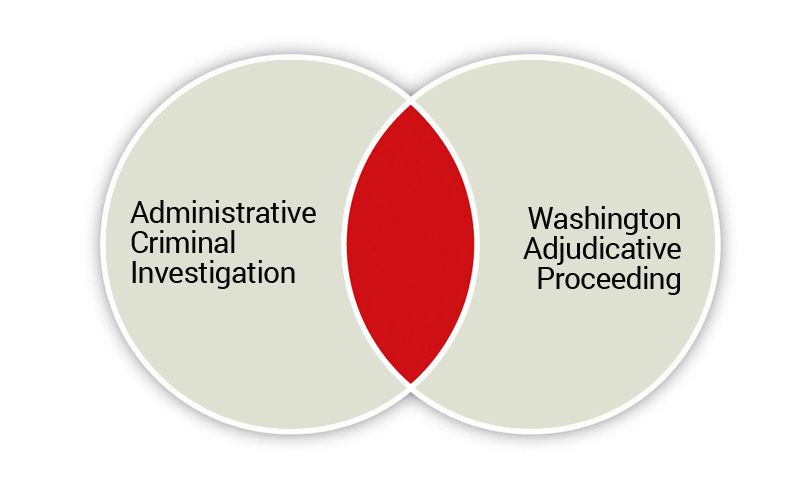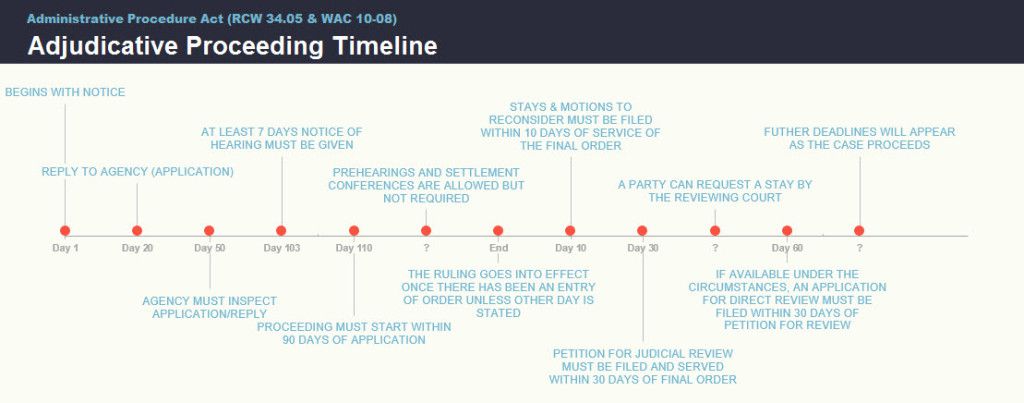Initiating Administrative Adjudicative Actions | An administrative law attorney | lawyer’s view on Initiating Administrative Adjudicative Actions in Washington.
For the most part, a Washington administrative government agency, may initiate an adjudicative proceeding against you at any time and visa versa.
The initiation of a legal action by an administrative agency can come in the form of a formal notice of action against you, demand you comply with an investigation, an emergency order or search warrant. It is important to recognize that investigations and actions are not mutually exclusive.

If you are being subjected to an administrative investigation, you do have some rights, though not as many as one might have during the pendency of a criminal investigation. In most cases, an administrative investigation is considered “civil” in nature with your compliance conditioned on your desire to maintain whatever certifications, rights or licenses the administrative agency controls. If you fail to comply with the administrative investigation, you jeopardize those certifications, rights or licenses. If you are being subject to an administrative investigation and are concerned about how it will conducted or whether you want to comply … the answer to these questions are highly fact specific, beyond the scope of this article and will require you to set up a consultation with a lawyer | attorney in our office. Similarly, if you are concerned about the potential of an administrative investigation leading to a criminal investigation, the same advice applies. These are the kind of situations where one should not proceed based on one’s own “subjective” evaluation of what is going on or what will happen, one should seek an objective opinion.
Receiving Notice
That being said, absent an investigation, often, the first “notice” a client | person receives of an administrative action is a document that states what is at issue. In general, most agencies, absent time restrictions will lay out specifically what is issue, though if the agency must act in a short time period, sometimes all you will get is “notice” pleadings … meaning just enough information get an idea of what is going on. Keep in mind, just because notice was just given on an administrative action does not mean that an administrative action just started. Prior to getting notice of an administrative action, bank records could already have been reviewed, witnesses interviewed and evidence collected: do not get caught unaware and unrepresented.

This notice will almost always provide forms and procedures that you must follow to fight, explain, contest or mitigate the adjudicative proceeding. If they don’t, don’t assume that the “clock” is not ticking. In general, by Washington law, administrative agencies must give you at least 20 days to file an “application” to contest the action, though some agencies give more. Regardless of you situation or particular deadline, it is essential you act quickly as administrative agency notices and deadlines are rarely, if ever flexible. Failure to respond within the time frame allotted is considered a default with little or no room for explanation. Whatever time frame is given, it is important to contact an experienced administrative lawyer | attorney as soon as possible so your case is not rushed, there is no risk of default and your case is handled in a well thought out manner.
If you are reading this, keep in mind that in general, with most administrative law actions, when counting the days for the most deadlines, the day of the act, event, or default which triggers the action is not to be included, however, the last day of a period of time is included unless it is a Saturday, Sunday, or a legal holiday, in which the event period runs until the end of the next day which is neither a Saturday, Sunday, nor Holiday. When the period of time is less than 7 days, intermediate Saturdays, Sundays, and holidays must generally be excluded in the computation absent some unique rule otherwise. These rules make it clear why we carry a strong opinion that people, businesses and clients should contact an attorney | lawyer immediately and not put of dealing with these kinds of allegations. One does not have much time to begin with.
Lastly, keep in mind that in some instances, an agency is required to hold an adjudicative proceeding even if you do not expressly request a proceedings, however this is the exception, not the rule. Do not assume you will get the adjudicative proceeding if you do not reply or expect a chance if you are late doing so. It is extremely important you participate and respond by the deadline or your nonresponse can or will be deemed in default and you will lose your right to fight or mitigation an agency’s action without any more notice or hearings benefiting you. The next document will simply be a notice of default with a final order against you with limited or no way to contest it. See our sections on Motions to Reconsider and Administrative Reviews and appeals which spell out our opinion on the need to create a record if you want to win.
An experienced administrative lawyer will be able to identify, discuss and help you weigh fact, argument and opportunity. Our firm is defined by its goal oriented mentality, blue collar work ethic, an intense dislike of losing and a refreshingly clear approach to candid legal counseling. Together, our lawyers have over 50 years of combined legal experience and an ability to act quickly. We practice throughout the state of Washington. Call or email us to schedule an appointment.


